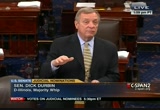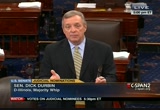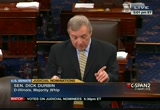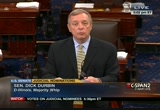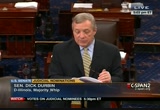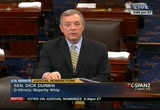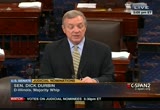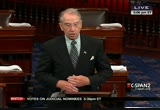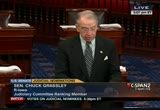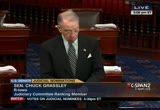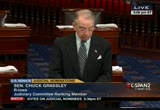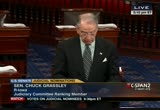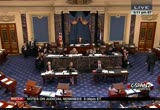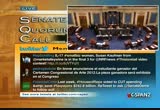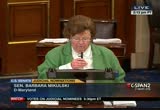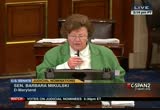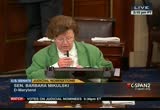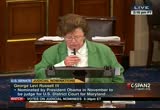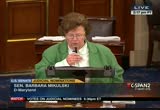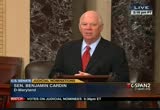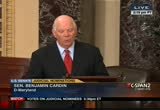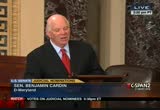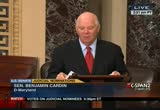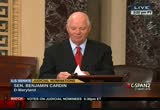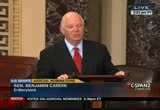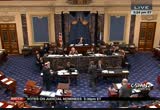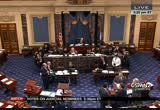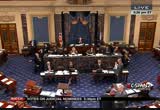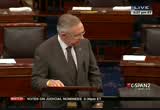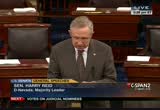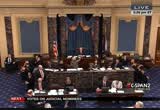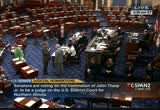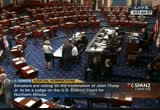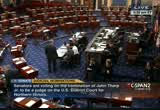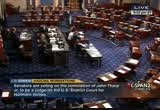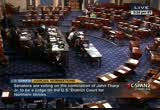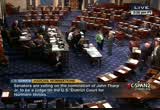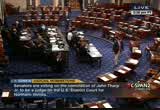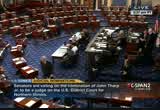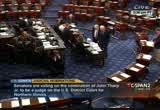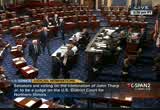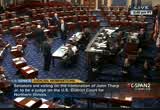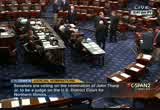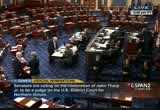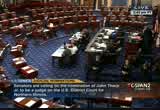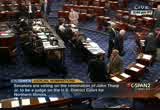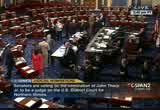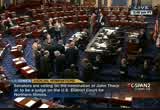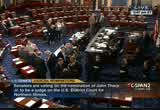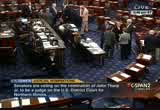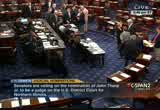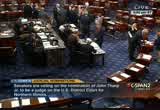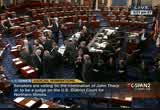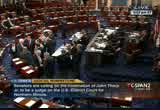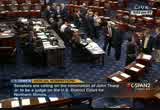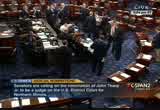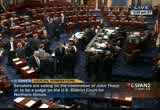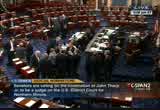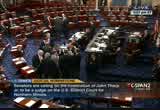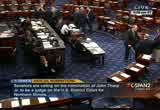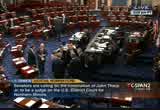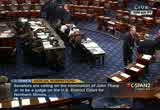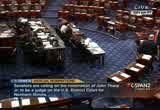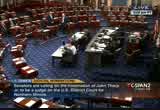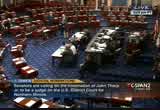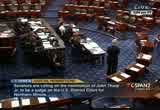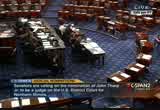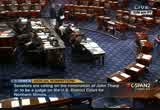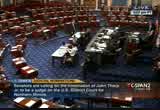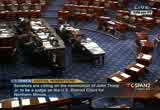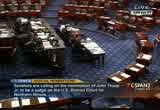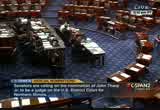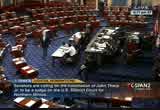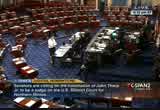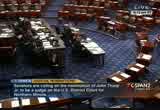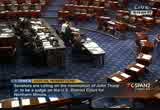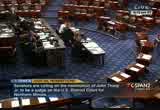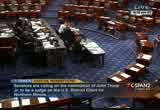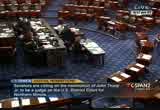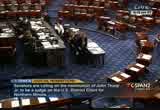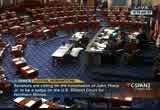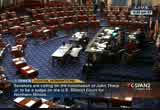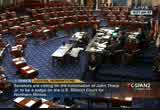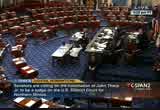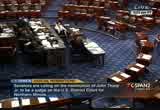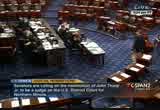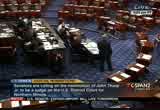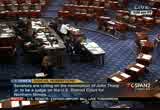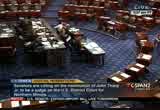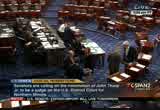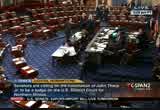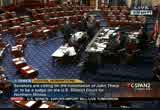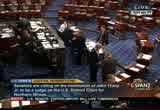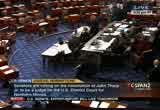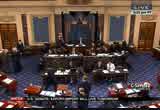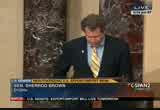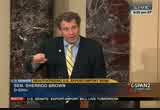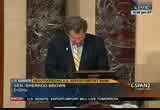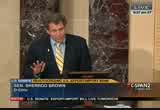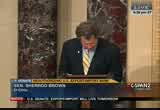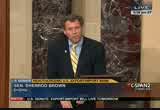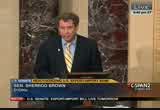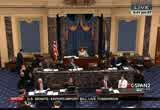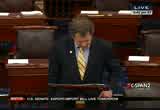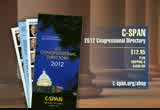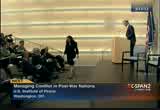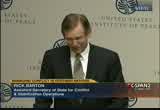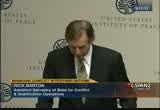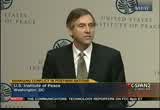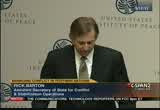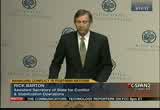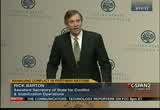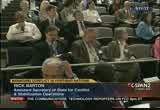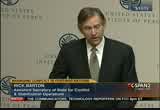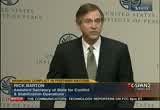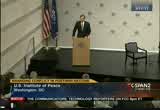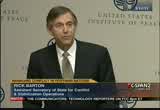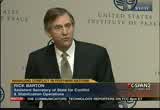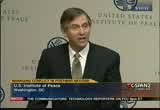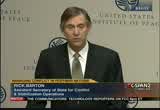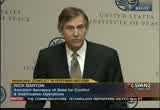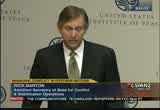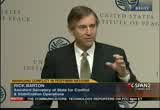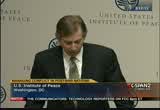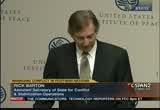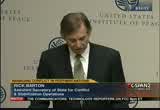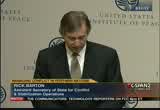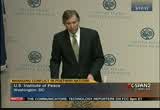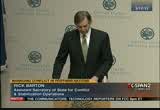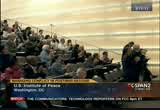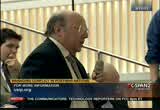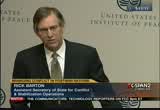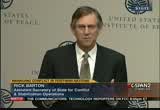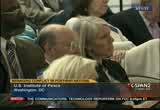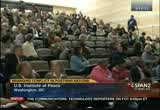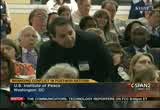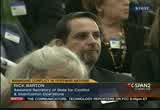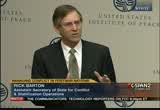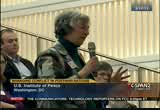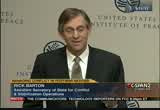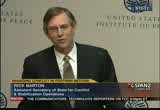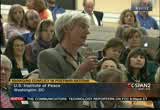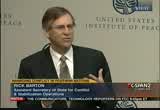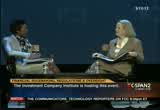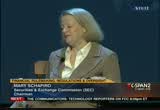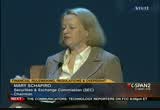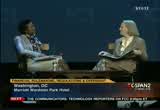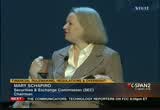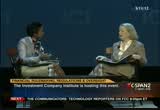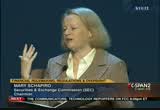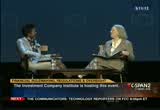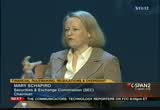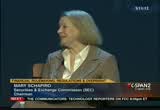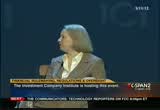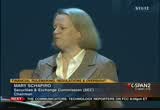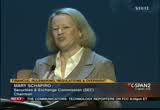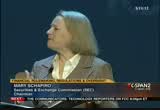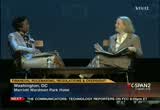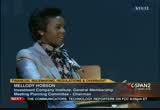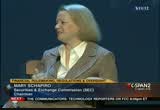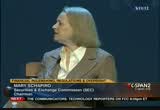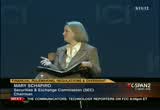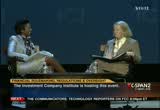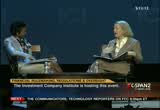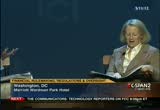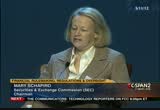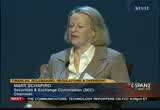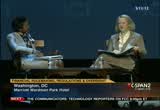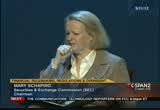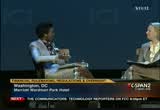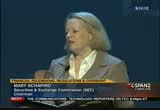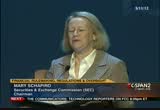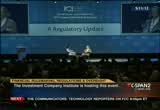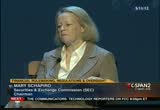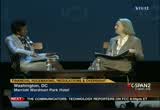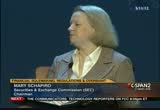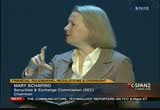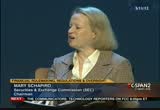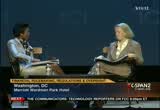tv U.S. Senate CSPAN May 14, 2012 5:00pm-8:00pm EDT
5:00 pm
through three or four different levels of investigation and some pretty serious investigation by the federal bureau of investigation, for example. that's part of the process. by the white house, by the senator's office, by the senate judiciary committee. so it's not ran easy undertaking. there might have been a time -- i know there was -- when these nominations would go through in 48 hours with hardly a question asked. doesn't happen anymore. hard questions are asked. then comes the suspense of starting the process and waiting for it to end. these poor nominees sit there with their professional and personal lives on hold, having said that they are prepared to step forward and serve a lifetime appointment on the federal judiciary and then they wait day after wary day, month after month sitting on this executive calendar so that at some point there will be a bargaining session and some names will go forward, some
5:01 pm
won't. this is what happened to jay tharp but it shouldn't have, nor john lee, both extraordinary qualified, should have gone through without this resistance. but this reflects what's happened in the senate. what is interesting about jay tharp is that every aspect of his nomination has been bipartisan. as i said, senator kirk put him through a bipartisan process for selection and senator kirk reviewed and approved all the nominees and then recommended him. it was last november 10 that the white house sent the two nominations from senator kirk and myself to the white house back to us, to the senate to fill the vacancies. john lee, who was approved last month, j. tharp will be taken up this evening. john lee was my choice. j. tharp was senator kirk's choice. we agreed, as i said, on both nominees. they were both nominated on the same tkaeufplt they appeared -- same day. they appeared together at the
5:02 pm
judiciary committee in january, almost six months ago. both reported out of the committee in february, about three or four months ago, in a bipartisan voice vote. it was my hope we could bring them to a quick vote. there was an urgent need to fill the vacancies. we have contacted by the chief judge of the district in chicago, jim holderman, and he's written and asked please move on these judges. i felt an obligation after senator kirk's illness to try to get this job done. i knew senator kirk would be here in person if it were humanly possible. i put his statement in the record. i know how strongly he feels about the qualities of j. tharp. unfortunately, for reasons hard to understand, this has dragged on for almost six months. up until a few years ago this, as i said, was not the way things were handled, not when it came to bipartisan nominees that were coming out of the committee with no controversy. and that certainly is the case now. but it's become routine, routine objections. that is presumption that something must be wrong with a
5:03 pm
nominee, and we'll just sit on him for weeks and months. that's not good. it's not fair to the nominees. it's not fair to the process. it certainly isn't good for the judiciary. under the last nominations agreement negotiated in march, for some reason, john lee made the cut. j. tharp didn't. i appealed to senator kyl, to senator mcconnell. i sent a letter in writing and spoke to it on the floor. now this is senator mark kirk's first nomination for a federal judgeship, and i know how important it is. i want to thank those who were responsible for bringing it forward today. i'm sure that he'll be relieved. i know j. tharp will be relieved when this is over. i've been very happy to stand up and support j. tharp as well as john lee. they are extraordinary individuals. there are other well-qualified nominees sitting on the senate calendar in a similar circumstance. after today's vote there will be 17 nominees pending on the calendar, and nearly all of them, almost all of them voted out of committee without any
5:04 pm
dissenting votes, with the exception of senator lee of utah, who votes customarily against all judicial nominees, these nominees but for a few haven't had any controversy. six of these have been in areas designated as judicial emergencies, including two nominees for seats in the ninth circuit, pal watford and andrew hurwitz, who are extraordinarily well-qualified. i hope my republican colleagues will give us a break here. these people deserve to get their moment here on the senate floor, deserve a vote. and the areas that they're going to serve deserve a full complement of competent jurists. it's time to restore sanity, comity and good faith to the way we treat judicial nominations on the senate floor, and it should start today. let me discuss j. tharp's background for the record. nominated when the judgeship opened up after judge blanche manning took senior status.
5:05 pm
a partner in the office of mayor brown where he is coleader of enforcement practice. he was born into a military family, very proud of it. son of a lieutenant colonel in the marine corps. j. tharp attended duke university on an rotc scholarship received an undergraduate degree summa cum laude. started, served on active duty with the marines for six years achieving the rank of captain and earning the navy achievement medal. after military service he attended northwest university law school, graduated magna cum laude, served on their law review. upon graduation he was a clerk for judge joel phlom of the seventh circuit and worked as assistant u.s. attorney in chicago for six years. he joined mayor brown where his practice has been in commerce commercial litigation and criminal investigation. he received numerous recognitions, served as adjunct
5:06 pm
professor at university law school. in short, j. tharp is a picture-perfect nominee for the federal bench. he has the callifications to -- qualifications to serve the northern district as well. i urge my colleagues to support his nomination. i say to j. tharp, the day has come finally. i'm sorry you got caught up in what has become a tiring political exercise where people are stuck on a calendar waiting for something to happen which springs them loose. this evening will be your opportunity. i hope the senate, and i know senator kirk will join me in saying that, will give j. tharp the unanimous vote which he deserves. he's an extraordinarily well-qualified nominee and i'm happy to support his nomination. mr. president, i yield the floor. mr. grassley: mr. president? the presiding officer: the senator from iowa. mr. grassley: i will be urging the people in my caucus to vote
5:07 pm
for these nominees, both of them. today the senate is expected to confirm these two nominees. judge russell, maryland; mr. tharp, northern district, illinois. as i said, i support the nominees and i do in fact expect both of them will be confirmed. we continue to confirm the president's nominees at a brisk pace. in fact, with today's confirmations, we will have confirmed 145 of president obama's district and circuit court nominees. i'd like to put this in perspective. we confirmed two supreme court nominees during president obama's term so far. everyone knows that it takes a tremendous amount of time and
5:08 pm
resources to consider supreme court nominees. the last time the senate confirmed two supreme court nominees was during president bush's second term. and during president bush's entire second term, the senate confirmed only 120 district and circuit court nominees. compare that, if you will, to the 145 district and circuit nominees that we have confirmed so far since president obama has become president. let me say that same thing a different way. we have confirmed 25 more nominees for president obama than we did for president bush in a similar time period. and of course president obama's term is not over yet. with these facts in mind, i hope my colleagues will understand why i get a little frustrated when i hear all of these
5:09 pm
complaints about how we're not confirming enough nominees. the fact of the matter is that president obama is being treated much more fairly than senate democrats treated president bush. it is especially frustrating to hear the other side complain about the vacancy rate. the fact of the matter is that the senate is doing its job. we're confirming the nominees that are sent to us, and of course we can't confirm nominees that aren't up here from the white house. if there is a problem then, it rests with the president. right now there are 77 judicial vacancies, but the president has made only 29 nominations. that means 48 vacancies or nearly 60% -- actually 63% have no nominee. now, stating it another way, there are currently 44 million
5:10 pm
americans living in districts with vacancies where the president has not submitted a nominee to the senate. i suspect that the president neglected to share that statistic with all the groups that he summoned to the white house one week ago today to discuss judicial nominees probably with the point of getting those organizations to put more pressure on the congress to approve more nominees and somehow approve nominees that aren't even up here yet for us to approve. mr. president, i could go on, but i don't intend to. i don't like to get into this back and forth with the other side, but it gets a little tiresome to hear the same misleading statements over and over again. and i want to set the record straight, and i have done that. i congratulate the nominees who will be confirmed tonight. both the nominees and their families should be proud, and i intend to put the remainder of
5:11 pm
my statement in the record, and that remaining statement discusses the qualifications of today's nominees and urging my colleagues to support these nominees. and i think that they probably will be supported overwhelmingly. i yield the floor and -- i yield the floor. the presiding officer: the clerk will call the roll. quorum call:
5:13 pm
ms. mikulski: the presiding officer: the senator from maryland. ms. mikulski: thank you, mr. president. i ask that the call of the quorum be vacated. the presiding officer: without objection. ms. mikulski: mr. president, i am so proud to be here on the floor of the united states senate to support the nomination of judge george levi russel. he is nominated for the united states district court and he has the enthusiastic support of senator cardin and myself. senator cardin will speak right after myself.
5:14 pm
i want to thank senators leahy and grassley for moving this nomination and the cooperation of senator reid and mcconnell. mr. president, when i take my advice and consent responsibilities very seriously. when i nominate someone for the federal bench, i have four criteria: absolute personal integrity, judicial competence and temperament, a commitment to core constitutional principles, and a history of civic engagement in maryland. i say these standards because i mean it. and i must say that judge russell, because he currently is on the circuit court of baltimore city, brings the right values to the bench. he has the necessary experience. he has seen the legal system from all perspectives and brings a top-notch background. he is nominated to fill the seat
5:15 pm
of judge peter macetti, who took senior status three years ago. it was a matter of, i think, urgency to confirm judge russell because of the backlog we have in our maryland federal court. prior to taking the bench, judge russell spent his legal career as a litigator. he spent ten years as an assistant u.s. attorney in maryland. he handled both criminal and civil cases. while there, he was also a community outreach coordinator. what does that mean? for an assistant u.s. attorney, it meant that he worked with the community, creating vital programs to reduce violent crime. as a young attorney, mr. russell also served as a law clerk for judge robert bell. judge bell is the chief judge of the maryland court of appeals.
5:16 pm
and i might add that judge bell enthusiastically endorses this nomination. judge russell is a man born and raised in baltimore. he graduated from the university of maryland law school and spent his entire career in maryland. he brings -- and his father, also a judge, was a legal pioneer in maryland, serving as the first african-american circuit judge. this judge, judge russell, has public service in his d.n.a., both working as a u.s. attorney on the federal bench and also in his connection to everyday life of people. he has been on the board of directors of the enoch pratt library, big brothers and sisters and the community law center. he has often been recruited to be a motivational speaker, an inspirational speaker, particularly to high school and middle school students, to
5:17 pm
encourage them to really stay in school and off the streets. he has particularly been enthusiastic about mentoring young attorneys and law students. the reason i talk about his civic engagement is that we want judges who don't live in a bubble. you know, it's great to be a legal scholar. it's great to know the law inside and out, but a great judge really knows people, and this man, judge george russell, iii, by being out there, whether it's making sure that the library is there for young people who want to move up, big brothers and sisters to keep young people out of trouble, working at the community law center, he's involved himself in the gritty aspects of baltimore city. he is a devoted public servant. he comes with a great background. he brings together recommendations from both the
5:18 pm
public and private sector, and i urge my colleagues in endorsing -- for endorsing the nomination of judge russell, and i ask their support in voting for him. mr. president, i yield the floor and hope the chair recognizes senator cardin. mr. cardin: mr. president. the presiding officer: the senator from maryland. mr. cardin: thank you, mr. president. first, let me thank senator mikulski for her leadership on the process that we have used in maryland on filling judicial vacancies. i'm very proud to work with senator mikulski in a process that screens lawyers, that are interested in becoming -- lawyers that are interested in becoming federal judges in order that we can get the very best to recommend to the president, and we think the president has chosen the very best in judge russell to fill the district court vacancy for the district of maryland. but i really wanted to applaud my colleague in the senate for the seriousness that we both take on filling these vacancies.
5:19 pm
we understand these are lifetime appointments and that we want to make sure we get individuals who have the qualifications, who have the temperament, have the integrity and have the commitment to public service to serve on -- to serve our judiciary. i rise today to urge the senate to confirm judge george levi russell, iii, of maryland to be a u.s. district judge for the district of maryland. judge russell was reported by a voice vote of the judiciary committee on february 16. judge russell currently sits as a trial judge in the baltimore city circuit court. judge russell is an excellent candidate. he received bipartisan support from the judiciary committee, is ready to take office upon the confirmation of the senate. judge russell brings a wealth of experience to this position in both state and federal courts. earlier in his career, he served as a federal prosecutor and as an attorney in private law practice. he now sits as a state court
5:20 pm
trial judge in maryland. judge russell graduated from morehouse college with a b.a. in political science and a j.d. from the maryland law school in 1991. he passed the maryland bar and was admitted to practice in maryland in 1991. he then clerked for chief judge robert bell in the maryland court of appeals, which is our highest state court. he worked as a litigation associate for two years at hazel thomas and then briefly at whiteford taylor. he then served as an assistant u.s. attorney for the district of maryland from 1994-1999, handling civil cases. in that capacity, he represented various federal government agencies in discrimination, accident and medical malpractice cases. he then worked as an associate at the peter angelos law firm for two years. in 2002, he went back to the u.s. attorney's office, handling criminal cases until 2007. he represented the united states
5:21 pm
in the criminal prosecution of violent crimes and narcotic cases during the investigatory stage at trial and on appeal. this included the initiation and monitoring of wiretaps to infiltrate and break up violent gangs in baltimore city. he also served as the project safe neighborhood coordinator for the office from 2002 until 2005. he participated in community outreach programs in coordination with the baltimore city state's attorney's office to reduce violent crime in baltimore communities. in 2007, governor ehrlich, a republican, appointed him to serve as an associate judge of the baltimore city circuit court for a term of 15 years. as a trial judge, judge russell has presided over hundreds of trials that have gone to verdict or judgment and has experience in handling jury trials, bench trials, civil cases and criminal cases. he has the professional experience which has been
5:22 pm
recognized by a republican governor and a democratic president. judge russell has strong roots, legal experience and community involvement in the state of maryland. he was born and raised in baltimore city and has extended family who live in baltimore. he served as a director and trustee of the board of the enoch pratt free library which serves the disadvantaged throughout the state of maryland. he served on the board of directors and the community law center, which is an organization designed to help neighborhood organizations improve the quality of life of their residents. he has also served as a board member of several organizations that devote substantial resources to helping the disadvantaged, including the big brothers and big sisters of maryland. i know that he has often spoken to young people in school about the obligations, duty and mandate of a judge and tries to demystify the role of a judge in a black robe. judge russell was particularly concerned with addressing the drug violence and mental health problems that plague baltimore
5:23 pm
city. mr. president, judge russell comes from a very distinguished family in the legal profession of maryland. judge russell's father, george l. russell, jr., was also a ground breaking african-american lawyer in maryland. he was the first african-american judge on the maryland circuit court in the 1960's. he was later baltimore's first african-american solicitor. he was also the first african-american president of the baltimore city bar association. in later years, judge russell was named by the governor to chair the maryland museum of african-american history and cultural commission and served as chairman of the board of the maryland african-american museum corporation. he was also asked to chair baltimore's judicial nominating commission. he has received numerous awards from the maryland bar foundation and naacp. his family is deep in public service, including his wife who serves as a judge on the district court of maryland for baltimore city.
5:24 pm
i am absolutely convinced that judge russell possesses the qualifications, temperament and passion for justice that will make him an outstanding federal trial judge. he will serve the people in maryland very well in this position. i therefore urge my colleagues to vote for the confirmation of judge russell to serve as judge for the united states district for the district of maryland. and with that, mr. president, i would suggest the absence of a quorum. the presiding officer: the clerk will call the roll. quorum call:
5:27 pm
mr. reid: mr. president? the presiding officer: the majority leader. mr. reid: is the senate having a quorum call at this time? the presiding officer: it is. mr. reid: i would ask that it be vitiated. the presiding officer: without objection. mr. reid: i ask unanimous consent that at 11:15 a.m., may 15, the motion to proceed to calendar --
5:28 pm
mr. reid: mr. president? the presiding officer: the majority leader. mr. reid: starting over. i ask unanimous consent that tomorrow at 11:15, that's tuesday, may 15, the motion to proceed to calendared 396, -- calendar numbered 396 h.r. h.r. 2072, be adopted. the only amendments be lee, paul, corker, vitter, toomey, that there be no amendments in order to any of the amendments prior to the votes, there be no motions or points of order in order -- than the budget points of order and the applicable motions waived. there be two hours of debate
5:29 pm
equally divided between the two leaders and their designees prior to votes in relation to the amendments in the order listed. upon disposition of the amendments, the senate proceed to vote on passage of the bill as amended if amended. that there be two minutes equally divided prior to each vote. that all after the first vote be ten minutes. that the amendments and passage of the bill be 60. the presiding officer: is there objection? without objection. mr. reid: mr. president, we have pending now a cloture vote. i have spoken with the republican leader very recently, and we think it would be to the best interests of the senate to do away with the cloture vote. i ask unanimous consent, therefore, that the cloture vote scheduled for this evening be vitiated. the presiding officer: is there objection? without objection. mr. reid: so there should only be one roll call vote tonight because the maryland judge we expect to be able to voice vote that.
5:30 pm
the presiding officer: all time is expired. under the previous order, the question occurs on the russell nomination. all those in favor say aye. all those opposed say no. the ayes appear to have it. the ayes do have it. the nomination is confirmed. the question is now on the tharp nomination. is there a sufficient second? there appears to be. the clerk will call the roll. vote: vote:
6:33 pm
the presiding officer: is there anyone else wishing to vote or to change their vote? if not, the ayes are 86, the anonymous is confirmed. under the previous order, the motions to reconsider are considered made and laid upon the table. the senate will be immediately notified of the senate's action and the senate will resume legislative session. the senator from ohio. mr. brown: i ask unanimous consent to speak as if in morning business for up to minutes. the presiding officer: without objection. mr. brown: thank you. i rise to discuss why the
6:34 pm
export-import bank reauthorization is important to strengthening manufacturing and to creating jobs in places like my home state of ohio. ohio is the third leading manufacturing state in the country, only the texas, twice our population, and california, three times our population, produce more goods than we do. the export-import bank is simple, it facilitates exports, contributes to job creation in the united states. it does this through loans and guarantees and insurance, filling in gaps in trade financing at no ultimate cost to taxpayers. yet despite this record of success, exports and jobs are at stake because congress cannot agree to ex-im reauthorization, in large part because there's a group of people in this body and down the hall in the house of representatives who think the federal government should not have a role enough in much of anything.
6:35 pm
the bank's lending authority is set to ex spire may 31. we must sacramento. the comib has been reauthorized by both chambers by both parties decade after decade. we know how important it is for job creation. but it's taken too long to get this reauthorization moving. while manufacturers wait, congress has stalled. we cannot wait any longer. we know that ohio workers can compete with anyone in the world when the playing field is level. when we stamp made in ohio label, it's a sign that an item was made with pride by some of the finest workers in the united states and some of the finest workers in our country. we know that u.s. manufacturing is getting stronger, due in no small part to increased exports with the help of the export-import bank. ohio has had quicker increases in job growth than other states. we know that the manufacturing sector nationally has gained back some number of jobs it lost. as an example from 1965 to 1998
6:36 pm
or 1999, this country had roughly the same number of manufacturing jobs. a smaller percentage of g.d.p., a smaller percent of the work force but a constant number of jobs and similar number of jobs in 1999 as we did in 1965 but in the decade after 1999, we lost some four million -- between three million and four million manufacturing jobs in this country. but, madam president, since 2010 almost every single month we've seen job -- we've seen manufacturing job increases. in ohio, in the presiding officer's home state of north carolina, in state after state after state in this country. that's good, obviously, but so many people -- too many people in my state are out of work or underemployed. what will happen to ohio workers and our growing manufacturing sector if we fail to do what we should be doing here if, if we fail to fund this critical resource?
6:37 pm
ohio's manufacturers have been able to increase their exports with the assistancened and the assurance that the export-import bank provides. in fremont, ohio, workers at crown battery an employee-owned company make renewable energy systems. with the help of the export-import bank's short-term multibuyer insurance policy, $400,000 worth of crown battery storage battery equipment was exported to south africa. middle town tube works in southwest ohio exports steel to pain and portugal with less risk because of the export-import bank and before that support nook industries in cuyahoga county required international customers to pay cash in advance of every order which is an average of four to six weeks. now nook industry has major customers in places like china and south cree and israel because of export-import bank support. exporting is tough for small businesses. large businesses need this less than the small company that
6:38 pm
manufactures things. less than 1% of the nation's nearly 26 million small businesses export their spructs pructs. imagine if we can increase that only a little bit in percentage terms. one of the most important resources to help small and medium sized businesses especially those who make things boost their imports -- their exports is the export-import bank. that's why the ohio manufacturers' association strongly supports its reauthorization. as they said, the export-import bank is the only tool american manufacturers have to recount counter the huge sums of export financing many hundreds of billions of dollars that other companies -- other countries and other governments provide their exporters. tom buffen burger from the international association of machinists told the banking committee last month american workers' families struggle in today's difficult economy, have little patience for gay tway
6:39 pm
politics -- beltway politics. i hear from the head of the manufacturers association who want to expand and gain access to foreign markets but can't secure private financing due to the credit risks associated with some overseas investments. export jobs already account for an estimated 7% of our total private sector employment. more than one quart of manufacturing jobs in ohio depend on exports for their jobs. in 2011 the bank worked with nearly 100 ohio businesses to support more than $400 million in export sales. reviewing the bank's charter should be a cause -- to renew the bank's charter should be a cause all senators support just like the 25 times, madam president, that the senate unanimously reauthorized the agency since its establishment almost 80 years ago. it's a matter of american jobs and a matter of global competitiveness but some people who seem to oppose everything
6:40 pm
that the federal government wants to do because of this philosophy that the federal government never does anything of use, forgetting medicare, social security, safe drinking water, clean air laws, all that, even though the senate has reauthorized this program 25 times, they're standing in the way and blocking it. we face a trade deficit with china of almost $300 billion in 2011, meaning that we import almost -- about $800 million a day more than we export to china. we know that china's export-import and development banks provide as much as $100 billion in export credits each year, more than three times as many new export credits as our u.s. export-import bank. it's time we continue fighting for and investing in american manufacturing. it's so important that like we do so well in ohio, that we make things it creates wealth, a strong middle class, opportunity for our young people. it's time to end the delay, it's time to reauthorize the
6:41 pm
export-import bank. madam president, i note the absence of a quorum. the presiding officer: the clerk will call the roll. quorum call: the presiding officer: the senator from ohio. mr. brown: i ask unanimous consent to dispense with the quorum call. the presiding officer: without objection. mr. brown: i ask unanimous consent the senate proceed to morning business with senators permitted to speak up to ten minutes each. the presiding officer: without objection. mr. brown: i understand that h.r. 565 has been received from the house and is at the desk. the presiding officer: the clerk will report. the clerk: h.r. 5652, be a arn
6:42 pm
act to provide for reconciliation pursuant to section 201 of the concurrent resolution on the budget for fiscal year 201. mr. brown: madam president, i'd ask for its second reading and object to my own request. the presiding officer: objection is heard. mr. brown: madam president, i ask unanimous consent when the senate completes its business the senate adjourn until 10:00 a.m. tomorrow, tuesday, may 15, the morning business be deemed expired and the time for the two leaders be equally divided reserved for use later in the day and the majority leader be recognized, further that the senate recess from 12:30 to 2:15 to allow for the weekly caucus meetings. the presiding officer: without objection. mr. brown: it's the majority leader's intention to proceed to the export-import bank reauthorization bill, legislation particularly important to my state, tomorrow morning equally divided the first hour with the majority controlling the first half and the republicans controlling the second half. today we reach an agreement to
6:43 pm
complete action on the export-import bank reauthorization, senators should expect up to six votes as early as 2:15 tomorrow. if there is no further business to come before the snoot i ask that it adjourn under the previous order. the presiding officer: the senate stands adjourned until 10:00 a.m. tomorrow.
6:45 pm
i feel as usomorrow. mietd mid it's a -- automatic of so you have dedicated so many wonderful years of and support efforts to the -- and so as i look around the audience, i see the people that i've, the dedication, the professionalism, your perseverance, or finding in the new job, the tenacity seems to be fairly important quality, and it's not necessarily i would put at the top of my list, i'm finding there must be more of that restrain than i realized before i moved into the state department and this particular job a few months ago.
6:46 pm
all of you have clearly shown that and thank you so much. without it we wouldn't be making the progress that we are today. thanks to melanie, doctor and mrs. cohen for the gift of -- and the obviously -- i think there a bunch of other old friends here that deserve mentioning. clearly bob love us, and the csso is here. stand up as well. make it possible for us to build a on a solid foundation. [applause] he's here now at usip as well. so we stand at the breakthrough moment, a chance to make the u.s. government more effective and coherent in building peace.
6:47 pm
and we must seize this opportunity. to do that, we'll need your continuing help and openness to change. at cso our mission -- we're trying to fashion an organization that can make an impact on policy and in programming in the first 2012 months of a crisis. it's a high bar and every time over the last six months that i've told people about our mission, i've heard the same two words spoken quite differently. good luck, and good luck. [laughter] in both cases, people want us to succeed, but i also hear concern that making an impact in some very challenging places is just
6:48 pm
too tough. we know we have a lot of work to do. all of us face difficult challenges, not only the places we work, but with the attitudes and the structures that confront us. for example, we know that almost 80% of recent conflicts stem from violence occurring within two years of the seat settlement or crease-fire. we know that the spending priorities and developing countries are remarkably consistent regardless of whether a country is at peace in civil war, or recovery from war. why? we know that in 62 staffing of of us -- why? to answer these questions, to be more effective we see the need for some moneyment tal changes. the u.s. has spent significant
6:49 pm
effort and money to address conflict, but whether we spend $3 million or $3 trillion, we haven't gotten it right. but with your help, i believe it is possible. we also know work likes yours at the local level has contributed to the longer-term decline in conflict around the world. i believe we're in the cusp as historical change. i believe that the exchange you have worked for and dreamt up for a long time, i believe in your work has brought us to the tipping point moment, for that, i thank you. making history is not easy. but i believe that if we can work differently, and work together, we have an excellent shot. many of you have been on this road for quite a long time. it's not hard to see a narrative arc to the work at the
6:50 pm
grassroots and international level. developing groups the links between violence and poverty began to address the root causes. began to practice this work systemically. academics began to find the boundaries and train practitioners. i'm speaking of the history i but any of these people are in the room today. meanwhile the field began to take shape at high levels everywhere. in the early 1990s they began to recognize our work as a distinct discipline. in 2005, the u.n. established the peacebuilding, support office. in 2008 the u.n. adopted the largest definition of peacebuilding. only 121 words. and of course, the diplomacy the review qddr released at the end
6:51 pm
of 2010 identified con politic and response as a core mission to the state department and lead to the creation of cso. secretary told me and anyone me and anyone who will listen cso is the most important thing to come from qddr. i know, she is invested in the success. by the way, i don't mean to suggest that cso's achievement of the movement. in fact, the u.s. must improve. but i do think -- has been on many of your minds for some time, is a great honor to have a chance to try to bring it to life. the qddr reflects the broader fact that we have reached a critical mass of people who have built a share of language for the need to analyze conflict, plan what needs to be done, and work together to do it. we are coming to the greater
6:52 pm
recognition that building democracy, building economic development, or health all build peace. whether it call it peacebuilding or stable decision or something else. we all need to work together to seize this moment. now, where would cso fit into the rather crowd space in our ambition is to be more effective as rob and dick described. as i mentioned even within the u.s. government we haven't seen the best coherence and coherence on our work on conflict. effectivenesses means a recognition that the u.s. is going to be a pivotal, and viable player but not always a dominate force. we need to be humble. so we've got to think about the lenlt of our stay anything place and the resources available right from the beginning rather than saying we'll get in there
6:53 pm
and make it up as we go along. effectiveness means boosting the impact of local ownership. everybody talking about local ownership and sustainability but i still don't believe that we do it. and frankly, we need to. we can't travel as freely as we used to. we need to expand our partners, we ned to get around standard bureauic procedures. we need to be much moring a l in what we do and who we can count on to do other things. we must bring a new sense of focus and urgency to this work. but we are offering at cso is essentially a process. it determines -- starting with determining a center of gravity. someone with cross-cutting authority. with the network of officers of people involved who welcomes help and encourages invasion.
6:54 pm
so then, if heaven for bid, we have 62 agencies works in a place, they know what each are doing. and they're working with each other from the start. we think of it as a bored of directors model, engaged at the front end as many people have an interest in the case, be inclusive, bring the ball to the policy making table. give them a chance to make their best arguments and come to decision in the way forward so anyone by then and no one can take a shot at that later. we then need a fast, and rigorous analysis that has built in the latest local realities. in and outside of the capitol. with the secretary interviewed me for the job, we talk about the how we should visit the country, sheed a mys she ends up with a same list of deliverables
6:55 pm
irrespective of the case. it's food security, regular fujis, all good causes. if you tell me which office or bureau is going out to do the analysis, i can tell you what kind of solutions they're going to come up with. we want to avoid an institutional bias with predetermined responses and instead answer the question what is most needed. we had the kind of analysis in burma -- including one from cso, under the offices derrick mitchell, the special envoy. we were trying to make sure that those local voices are heard and they drive the thinking that takes shape. as you know, cso has the own analysis tool, the icaf, i know minnesota of many of you have
6:56 pm
yours as well and sometimes they produce different conclusions. we want to learn from you and define the icaf in large part to make it more strategic and influential. the analysis that we all do should lead to the next step. a single integrated strategy that two to three priorities that provide direction for all. many of these places need everything so you can never be wrong from infrastructure to schools to justice systems. but the u.s. can be at the nation building model. we can't afford to work on priority numbers seven or eighth, we need to be on one, two, and three. we have to be catalytic and shake thiewr those local people have the ability to make it on their own. next, the strategy leads directly to making sure the people, programs, and resources
6:57 pm
address the priorities. burma will be a challenge in this regard. it's exotic, it's safe, everyone wants to work there. but to work coherently together will be a center piece of our being effective. finally, we need to make sure that we are measuring and adjusting or work as we go, learning in real time and not two years after the fact. with this approach, i think we as u.s. government can greatly increase our chances of success. and it will help us work better with all of you, hopefully in a transformational way. at cso we recognize we have the coming year to prove that we can improve the response to show change and impact. so for this year, we told the secretary we have three goals. first, we have to make an impact in two to three places of real significance to the united
6:58 pm
states. to do that, we'll decade 80% of our effort to form educations. right now, they are syria, kenya, north central america, and burma. then we'll have another eight to ten places where we can test new approaches or make a welcome difference by sending the right person at the right time. so for a, i think we're gaining transaction in each of our major priority engagements. many of you working in these places and we realize we won't know it all or know best about them so we hope for your support. in syria, we are providing a nontraditional surge to empower and yient a infrastructured, nonviolent opposition. as the secretary announced, that includes providing nonlee tal stance. we are working with partners to set up a outpost.
6:59 pm
in kenya, we're helping to develop plans to ensure peaceful and credible elections a year before the vote incidentally, kenya is one place where we have seen a potential model for broad cooperation and innovation. in northern central america we have a governess problem that can effect our interest more directly. we are bringing emergency to address the violence on a regional basis specifically to honduras, guatemala. and burma, as i mentioned we are sporting analysis and focusing on ways to connect within the minorities and the sub national level. our second goal for the year is to build a trusted and respected team. we want to be the people in the u.s. government who bring everyone together to find solutions to conflict. we brought in an entirely new
7:00 pm
leadership team. refocused our preed sorry and reinfrastructuring the civilian response core and other core resources. we are reduce the size to a proven leader who can lead our enbasements. at the same time, we are expanding our reach to deploy experts from inside or outside government on a pay as you use basis. instead of keeping a large standing staff. we are moving the ability to deploy the right person to the right place just in time while expanding our partnerships. for example, this is one of my favorite stories. we recently got a call from the u.s. ambassador in liberia seeking our help. the day before the presidential runoff in november, a demonstration turned violent and one person was killed and eight were injured by gunfire. some felt the police of.
7:01 pm
were impacted. thely beesh began commission set up to investigate the commission didn't have the capacity to conduct a inquire. which put the government at risk. cso sent an expert from the just sis department from the civilian response corps. who ensured the information on track. ly beer began investigationers interviewed 70 or 80 people. and found a 15 second slice of the video showed specific police firing on the ground. it actually happened in three different ways. one of the liberian investigationers first saw a plain clothed person in a rather exotic shirt and heavy arm band firing into the crowd. actually the video showed a pop, a little bit of smoke, and you
7:02 pm
could hear the noise. and still foots to be confirmed who that person was, as it urned out it was a high-ranking member of the presidential guard. that same 15 second clip was shown to the department of justice investigator who then saw another policeman in the same frame shooting. this one in uniform shoot into the crowd. he then showed that same video clip to the commission members, the liberian commission members. one of them saw a third person in the same 15 second clip fire into the crowd. that became the critical evidence that has lead to police suspensions, further investigation, and the president of the country taking responsibility. a great case of a rule of law and strengthening of the political process. it also shows who we are and how
7:03 pm
we work are as important a what we're trying to do. to make quality impact in the first twelve months takes agility that is different than the way the u.s. works. our third goal is to work in more areing a l -- in the field that part is working as a about dote to the burke in washington. they can move like an elephant. its powerful but very large and it can predict where it's going and be sure not to be underfoot. our goal is to work in a nor nimble, speedy fashion which means more help from our partners. i used to ask would your rather spend $9 00 million on the largest u.s. embassy in the
7:04 pm
world or would you rather $500 million to train 500 americans 1 billion for each of them so they could be capable of working in a place like baghdad? how many of you would favor the embassy? [laughter] so we pretty much agree almost anonymously. but i've got bad news for are you. since i started asking this question, they built the embassy, it cost a lot more than $500 million. we're trying to figure out what to do with it. so we've got to find a way to do things differently. violent conflict has unofficially dominated u.s. foreign policy for years. so we need to expand the community of people who recognize the centrality and can address it head on. there's a lot of room for
7:05 pm
improvement and i hope we can join in doing that together. i want to take a moment now to address the tension that we sometimes feel when not -- nongovernmental groups and governments find themselves in the same space. the u.s. has the national interest at heart, and often strich for neutrality, and those are not always the same thing. i think key is to be honest about what our interests are in sync, and when we might need a little space. we should feel like we can help each ore but also keep our distance when necessary twat being a snub. good, open communications should make that possible. with that, i want to offer you a challenge. when i was csis we went out to measure progress in had afghanistan for the first time
7:06 pm
almost everyone i spoke told us what they were doing was working while the larger surprise was inters was not going well. we had a situation where we heard 100 success stories that somehow added up to one very questionable larger effort. there's no math mall call equation that allows 100 pluses to equal a negative. of course, almost everybody had an explanation but it completely reinforced the flaws and the approach that we take to these places. so here's some questions i wonder if you're asking yourselves are you working in places that really matter? even though is it possible to be transformative, is the larger situation getting any better as a result of your involvement? even if you're doing brilliant work, what's happening on the broader scale? asking these questions, is part ever our goal --
7:07 pm
part of our goal and i hope part of yours. we're looking at the next dramatic event and how the u.s. can be a responder and intervener. these are the questions of our time. in this space, we've seen these questions in their rawest form. people are actually killing each other because they can't figure it out. and there's nothing more profound to human life than people killing each other because they can't figure it out. so in the most fascinating, most delegate, most demanding, most responsible moment imaginable and we're trying to say, is
7:08 pm
there some way the united states can help so it doesn't lead to something more -- much more tragic. we need your help. if you ever hear me say we're on top of this, we've got under control, give me a call or send me an e-mail because we need all the help we can get. there is plenty to be done. we need to keep building the work in congress, elsewhere in the government, and we are partners of all stripes. we need toics up and -- we need to expand the base of the people who believe in this work. and as i said, it can't be business as usual. thankthank you very much. [applause]
7:09 pm
>> rick has kindly offered to take some questions, if there are questions from the audience. i do have to ask a question myself. will somebody be handing around the microphone? or do people go to the side? >> handing them out. >> handing them out. please, raise your hand sob they the handers out can see you. and stand up and introduce yourself. there's a question down here. >> i'm bob, proud member of the board. i'm wondering, you know, this
7:10 pm
more implicated world we're in -- complicated world we're in, we'll want a lot of companies on the journeys so you mentioned internationally, the questions you've raised. we'll want asked within a lot of governments. i'm worn wondering in and nato and so forth, your questions are residence nateing well. >> thanks, bonn. bob. yes. [laughter] i've always wanted to give one-worded answer. i'm more likely to go on than to be as suck subject as he was. i admire his skill. the answer is yes, we're whether talk the smand command leaderrers here the u.s. government on the u.k. government, or the the colleagues i had a chance to work with when i was at the u
7:11 pm
u.s. u.n. there's a great recognition that we've got go out at this in a much more creative fashion. and one of the things i notice having worked on this for about twenty years and maybe thirty or plus places now. most of us tend to be influenced by the most recent experience. that's puts us at risk in this country. want most recent experience was a huge one in iraq and afghanistan. i think as dick suggest as the next realm of conflicts have a different flavor and different than with a we saw in the 1980s where most of us were shaped by bosnia. a lot there were other catastrophes going on. to make sure we are accumulating the knowledge rather than actually thinking we we've actually got. one of the things that's been
7:12 pm
most fascinating i never know where i'm going get the parallel experience. i find in the congress go there's a little bit of haiti. and in an goal ya there's a little bit more of -- normal we put regional experts. it's part of what we want to do is to have an intelligently challenging enough environment that there's a creative tension within the state department and we don't end up rushing to a consensus view within the u.s. government that this is the way to do something. but make it a more rigorous test. that involves kind of a give and take with regional bureaus in particular that's going to be -- have to be more dynamic it than it in some time. that's one of our significant challenges. but the other thing i would say about the counter parts in other governments with, more specifically to your we. we're all relatively small
7:13 pm
boutiques. we're still all kind of finding our space within our larger bureaucracies, and so nobody -- so we have to come together when i was working in -- i always used to say it's nice for us to be doing what we're doing. but when we can't be a professional team that practices all the time. we have to be in the league. there's got to be. so you to have people to go out. competitions and creative tension should be part of this model, and so that's why you almost always never use the word coordination. i believe we have to work together as a fine textile. i can see that. let me come back here by the microphone. the gentleman back there. yes. >> thank you, i'm kristin from
7:14 pm
american university. i am from greece, actually, and i found myself working on greece import that i wasn't expecting in my lifetime to do. it has to did with the greece as a state, and the liability original -- and original security in case that greece becomes a failed state. so a question i have, how many steps ahead around the world in cases like greece and others, they are lose to the coming. so the limits cachts in terms of mining resources, how many steps can you see before thing get bad ? >> well, i can answer for cso
7:15 pm
and say we have partners like usip that can get out even farther ahead of us. i can hope that many of you will be well ahead of us. that would mean that -- that would give me a greater sense of confidence that we're on top of this. i'm sure in some cases and some places, i don't think it's true in the case of greece. the u.s. military has war plans for places on earth. it strikes me as a minimum requirement that we should have comparable civilian thinking. the fact that we don't would shock many taxpayers. so we -- so all of us need to do that kind of fore thinking. and it doesn't matter who gets to write the first piece, or draw our attention to it. for any of us who spend any time
7:16 pm
in boss bosnia, the trip from accident occur -- that's a one and a half hour flight seemed like a sudden way to go from europe heaven and europe to hell. and it certainly gave me the very raw introduction to the very front end that never be arrogant about what you have. so we shouldn't be anxious about these places. because the anxiety is what prevents disasters. since most of you are in the convention business. you recognize that. it's not out great feeling. worrying stuff doesn't make you feel great. it's better to be worried it than to see the event wall. i think places like greece we should be alert to. probably for cso our focus is going to be in three kind of
7:17 pm
case website shot hot spots, too big to fail with and long standing conflicts that don't seem to be raise the high schooling. you can see what kind of places fall into each of those. what we do might be different. we might have a full-scale operation and trying to push the u.s. government to make sure that the assistance there is focused and another place we might just be doing advanced strategic planning or advice an embassy. that's the model of work we're building upon. >> this one right here. >> thank you very much. my name is rein i mindy riser. iefmg representing global peace services. a question about the richness of u.s. government. they have been involved in clb ration. the peace corps. has the own
7:18 pm
identity is at the das assistance but certainly the people on the ground have a such insight and such commitment to the well-being of their country. is there way their insight can be fed into the process. and the programs there are now many people from all parts of the world who are in the united states and americans overseas, they i have insights, they have world knowledge of that others don't. is there a to tap into the extraordinary intengtial resources. >> sure. age lot of processes that i've seen at cso invite that kind of broader participation. but part of is the differentuate between sort of formal sharing of information and informal. my feeling, always, when i was at oti, everything we were doing was basically an overt state. and being in an overt space
7:19 pm
meant that we were transparent about the information we were collected. we should be sharing it with anybody. and if the intelligence community wanted to know what we were thinking, it was fine, it was public information. i feel that that's one way to get around this sort of worry that people have about their insights being misused by the official world. what i do is open, i'm sharing it with anybody who has an interest in promoting peace in the place. i think that's probably the easier formula where people like the peace corps. rather than being seen as information gathering as the u.s. policy uprise. on the other hand, one of my favorite sayings was a retired intelligence officer who was living in princeton when i was teaching there. he stood up one day and said, i found after i retired i had an advantage that none of my former
7:20 pm
colleagues had. i had open and free access to open information. i think actually, it's interesting now. we get some analysis data from the intelligence community. it's actually based on totally available information. so they saw as a weakness their own work. it's actually that -- it's quite helpful to them collect it. >> one more question. >> maybe this woman right here. thank you, my name is betrees camp. i'm a state department officer. >> i'm sorry. >> on death to the smith smithsonian. i want toed to ask whether any part of your office is working on cultural recovery issues. smith smithsonian did a lot of in work in haiti after the earthquake. i was thinking we had a
7:21 pm
briefings discussion about ambassador derrick mitchell. whey were doing in burma the environmental research there which over the last twenty years are building a foundation. on the cultural art facts the baghdad museum issue. is there anybody in your office in the bureau that's looking at that issue. >> the answer is not specifically, no. but i would like to be able to say,ic we're working on it, is to really understand these cases, you better not approach them as just a political optic or economics optic, or, by the way, the foreign anthropologist in haiti more than any other place on the earth. when you get the convergence of violence in the society. when it breaks down this badly it's usually a witch's brew. to understand it, you have to
7:22 pm
all of those disciplines in play. that's part of what we're trying to build at cso. i hope that our talent to be respectedded and trusted is going to have that kind of breadth of understanding. when the cultural issue would rise to be one of the two or three top priorities in place is difficult to say, but it's possible and they shouldn't be excluded anymore than it should be the the default position that we take. so i'm really hoping we'll have the freshness of analysis that we'll be sensitive to those kinds of opportunities and not be captainive of anyone when it gets there. thank you all very much. i really appreciate it. [applause]
7:23 pm
>> the head of the secure to thin exchanged commission marry shapiro that regulators are situated -- significant trading loss. the n. company hosted this 40 minute event. >> you one of the most conversationed thirty days. and when people found out when was a q and a. questions came flying. i hope we have a great discussion. i'm excited about that. i'm going to start off talking about about your career and setting the stage for conversation. you have a remarkable career as paul mentioned. clearly, obviously now chairman of the fcc but the mod ties. you were commission in the '90s. and the question that i have is, how did the prior roles prepare you for the job you have right
7:24 pm
now? >>, you know, erg you do prepare grows for whatever comes next. if you are willing to take the lessons and learn them. being in government help us a little different today than it was fifteen years ago. the opportunity to work at fin are a, and the public and private sector but still in the regulatory role was instrumentive and constructive. i spent lots of time with broke age officials and people in the business and got to learn on the issueses that they confronted every day. ul of that helps to what we're doing now if the rulemaking states. running cftc a tiny agency with a lot of responsibility was, you know, again helpful in understanding all those bigger agency helped to approach the issues fcc would have from a management and operational perspective. that was helpful.
7:25 pm
i really think sort of generally everything you do prepares you hopefully, if you're willing to be and aissue the lessons for whatever comes next. you have to change course and modify your thinking and learn from the new things. i think it helps you build a more solid foundation for whatever challenges are throne at you. >> one of the things you said in the answer, is government today is different than it was then. how is it different. >> when i think about when the fcc was like when i was there from 1988 to 1994. and then looking at today, first of all, the stakes are very much higher today because the financial crisis. i came in at the time when obviously, people were reeling and continue to be, and understand from the remarkable talk about what people are going through today. and that's clearly wasn't the case in the late '80s and
7:26 pm
early '90s. the product is more come complex, the markets move at lightening speed, the world is much more interconnected and more highly globalized and confidence in government, and governmental institutions is no what it should be investment profits in the industries is at the low. i think all of that presents a lot more challenges. of course another big difference, i was a commission of that. and chairman now. the job is very much more complex as the chairman just because the responsibilities for the administration and the management of the agency as well. >> i read or heard from the friend you played basketball in high school. >> i played field hockey and volleyball and. >> did playing those sports and
7:27 pm
some of the defensive efforts you had to make help you in the role that you have now and. >> i was recently -- this is maybe my proudest moment was featured in will cross magazine. and i have to say that i went to -- the l.a. cross team is unbelievable. they've been division three champs for several of the last five or so years. they are extraordinary athletes. i wouldn't carry their stick for them. they are amazing atd leets, and what i'm seeing now team sports does for you teaches you team work. it teaches you that there are times to be aggressive and times to hold back. there are times to get yourself out of the way and let your team do what they need to do. there are ways to signal each other and anticipate what the
7:28 pm
others on the team are going be. in order to achieve the goal, in that case, actually goal. i think i actually tell this to the daughters and young people when i do commencement addresses. being on a team is one of the i thinks that will serve you well for your entire life. it really isn't about you. it is about the team. when i look at the team, we built with the fcc, i'm so honored to serve with people who are committed and hard working and creative and innovative and open-minded. it feels very much like being on the field. and taking queues from each other and driving toward the same goal. >> i want to come back to the team thing in a bit. i want to ask you one other question as we talk about your career. where did you get this drive and interest in public service. you can do anything. and yet --
7:29 pm
specific niche serving. >> you know, i don't know where it frame, but i do know that i love policy. i started my career right out the law school as for one short year a trial attorney and hated it. i didn't like the tension of it, and i didn't like the narrative issue of this is what we're doing, and i love the public policy. i love the idea that we can effect people's lives. we can make a difference. we can build coalitions and collaborate and gather information and tackle problems and actually really make a difference. i never thought i would do in the financial world, for sure. but it's wonderful come together fcc every day and know that you can face any one of the issues.
7:30 pm
we're talking about accounting issues from 10:00 to 11:00. and 11:00 to 12:00 we're talking about whether we have enough disclosure about foreign sovereign debt holding. and from 1:00 to 2:00 we'll be talking about dark holes in the transpart sei of the trading markets from 3:00 to 4:00 we're talking about mutual fund issues or broker dealers the scope is just exthe record.
7:31 pm
the >> why of all that is required. do you think that backlog is good or bad? >> that's a great question. get this done. why isn't this done but you need to take your time because there's a lot of comment and these are monumental of rulemaking for many cases taking for example the over counter of a smart kid. a couple of unregulated markets the fixes to the tune of
7:32 pm
$600 trillion to outfit a regime around it. it's not as though we are arriving on a clean slate. we worry about unintended consequences we worry and try to be humble about what we don't know and don't understand and need for others to teach us what and that takes a lot of time. on the other hand we have a sense of urgency because the financial crisis rulemakings and the public expects us to address and we have our own sense of urgency because we don't want to repeat the issues that put us in terrible shape that we have been. so there isn't a simple answer. it's not good but it's not a bad necessarily that they are taking so long. it's become a cliche among all the regulators to say we are taking the time to get it right
7:33 pm
that the reality is like most cliches it is in fact true. we are trying to take the time to get it right. >> there is no question that you have come to be share of the fcc to rein extraordinarily difficult times. we know what we felt on our side, so we can only imagine how you'd been drinking from a fire hydrant that has come to you and there have been pretty bad things that happened. bernie madoff, we have had a systematic failures, there's been big things. many of them you've walked into. and you were not there before they happened. as as a result, you talked about restoring the agency, restoring respect for the sec. where do you cingular in that process? >> i think about this a lot. i think as you pass each one year anniversary to sort of think about what have i gotten done, have any difference? so i'm coming to three and a half years now. when i arrived at the agency in early 2009 in january, she had
7:34 pm
just been arrested a few weeks before i took office obviously still reeling very much in the financial crisis and some of the agency programs like the consolidated supervised program over the largest investment banks that haven't functioned very effectively. but it's pretty dispirited i have to say there were a lot of vacancies at the senior level. the budget hadn't grown for years besides the complexity of the job having grown enormously, and so when i look at where we are today, i feel pretty good about it. we are a work in progress as every institution always should be. but we've brought incredible talent with current wall street experience and financial service experience. we have the experts at the fcc for the first time. we have people right from trading directly from operations in the major financial institutions from credit rating
7:35 pm
agencies that have brought in great talent. we have focused on one of the important criticisms of the agency which is a lack of cross divisional cooperation and collaboration, stovepipes that allow things like dirty madoff to be out of control coming and we have done lots of work internally through the hiring of new senior managers and also through things like the cross border working group the bring people from all over the agency to tackle their problem, and in that case, and you've seen the results of this, the chinese companies in particular reverse mergers and the companies to publicly offer their stock in the u.s. and they've brought lots of cases. we've done lots of exchanges to improve the standards in that regard. so all these collaborative efforts we took the enforcement division which is in many ways of people know the sec and it is a very big division, it's
7:36 pm
certainly not everything we do and we of restructured it and took out a layer of management, not something that used to happen in government jury often and we put people to our managers back on the frontline in the investigation. we created specialized units like the asset management unit that could become highly expert in areas of the security law so that people were not doing inside trading this month and market manipulation that month and accounting the next month highly inefficient but can get deep expertise and the municipal securities, the asset management, market and use area, the correct act which have reorganized the examination program so it is much more and the result of that are clear in the number of referrals from the program to the enforcement program. in force but had a record year last year. we brought more cases than ever before in the agency's history. so, sort of an area by area
7:37 pm
we've tried to think about how do we do it better, how do we become more agile and become a regulator that you have a right to expect us to become the public has the right to expect us to be coming and i say that lots of work to do and always will be and i will take technology as one area where we still have a very, very long way to go. >> if you purchase a 100% respect has been completely restored are you at 60, 50, 75? >> it's all hard question. >> do you feel like you are more than half? [laughter] >> it's probably a dangerous question to answer, so i won't answer it. [laughter] but i will say and i firmly believe we are on the right trajectory and we have had tremendous accomplishments in
7:38 pm
revitalizing the agency story and the confidence and our ability to do what needs to be done. but we have a long way to go and we should always view ourselves as having a long way to go. the moment we say we are done, we are perfect, we are the agency we need to become i guarantee we are not coming and it would be a mistake to take our attention away from our internal reforms and our efforts to always get better. >> when you are right you rock. >> that's a great saying. >> when you are done you are already sort of downhill. you made a point about the record number of cases, and i've been curious about that. i read the statistics the was 40% more in the last two years 42% of the exam identified significant findings that by one-third since 2009. you stated in one of your
7:39 pm
testimony. >> is it because people are doing more things that are not right or you are finding things you didn't find before? >> i think it is more of that our staff is better trained than they've ever been. we have more expertise than we have ever had before coming and we are doing a brisk pace that fans so we are looking in those areas where we think there may be problems or even if we don't have a suspicion of problems we haven't seen red flags we know that if there is a problem it could have severe impact on investors and on investor confidence, so we are focusing on those things and we are more likely to make referrals to the interests of this significant findings because of the potential to hurt investors. now at the end of the day we are not be enough to do everything, and we are not everywhere and i do think sometimes there is a misconception by the public that
7:40 pm
the sec is kind of the everywhere doing everything but i like to tell members of congress when i am pleading for the budget that is the size of the d.c. police department, yet we have responsive of the for the largest capital markets in the world. there are 10,000 public companies, there are 5,000 broker-dealers, there are, you know, many thousand mechem will fund groups with trillions of dollars of assets under management. we can't be everywhere, so if we can't use data and risk analytics to help us focus those resources in the right places we will spin our wheels. i think we're our statistics show, and then it is another thing that's different, we have a great performance now that we've never had before and we have really insisted upon to see if things we are trying are working or not but if we don't use these risk analytics to help us focus we will spin the wheels and we will not be focused on the right things for investors.
7:41 pm
i feel that is where you are seeing is we are doing more of the right thing which is not to say we won't miss things, but i think the numbers reflect the we are looking in the red area. >> i want to switchgears to the regulatory environment that you work in and specifically you are a member of the newly created financial stability oversight council which brings all the regulators together to focus on some risk. global regulation is a higher profile with a group of 20 creating the financial stability board. so i was thinking about, you are in the room with a lot of banking regulators and i was wondering how does that shape you're thinking? >> it's really interesting because whether it is the oversight council, which is our domestic u.s. regulators, the capitol markets regulators like the cftc and the sec but the many bank regulators and insurance regulators or the
7:42 pm
financial stability oversight council we really need some new acronyms. and while, never mind, we have others. others of these oversight bodies of regulators, too, like the financial agency oversight board and the financial stability oversight board. >> before you answer that question the layer upon layer, does that make it harder for you? it's good and has its challenges. the good part is coming and i've been a regulator allot time in the introduction, never have i seen regulators coordinating and collaborating more closely and that is a clear lesson of the financial crisis that domestically and internationally we need to have a much better sense of what each of us are doing and what happens with our regulated entities. we are not quite there yet.
7:43 pm
>> hopefully we will get their. that cooperation and coordination is really critical and these are mechanisms to that. they are not in and of themselves, they are really the means to an end, and as a domestically i think it works pretty well. we need fairly regularly. we are not in the process of designating financial market utilities and systemically important financial institutions for heightened provincial supervision. about we talk a lot about risk and we put out an annual report coming in the next couple of months that talks about the risks that we collectively cease to the u.s. financial system and the u.s. economy and it covers everything from money market fund reform which i suspect we will talk about to cybersecurity and the low-interest rate environment. a whole range of issues and said it is a wonderful gift and take and it's forced the agencies to get to know each other and work
7:44 pm
together well. on the international level, its perhaps not quite as fluid, but it is also great for sharing the essentially what we are all doing within our regulatory regime and how hopefully through this process with the fsb in particular and the g20, we will create a regulatory regime for over-the-counter derivatives in particular that rating agencies and other entities will work in a global financial environment and that we don't end up with regulatory arbitrage and we don't end up with gaps. bank regulators spiegel will but a different language than the capitol markets regulators, and their focus is different. but we all share the same concern about the stability of the resilience of the financial system so we have learned a lot from each other i seek and, you know, it will continue to revolve i think. >> you brought it up.
7:45 pm
>> i know, and i shouldn't have. >> i was going to make sure you like me and that we were good. [laughter] all right. it's no secret the sec and the mutual-fund industry are handed over this issue of money market funds. we all know where we stand so let's not debate that. how do we solve that? >> we know where we stand. although i have to say thank you to a lot of people in this room who come to talk to us and even in the last couple of weeks about these issues about how we speak the same language and approach the differences and find a way for the constructive and positive and collaborative and i think that's wonderful and i applaud those funds that have
7:46 pm
talked about that. i think we have a very legitimate concern about the risks that are posed by the stable it's all hypothetical and we know what happened in 2008, and we all know i think as well for the treasury is stepping was going on and had an effect on the broker-dealers as well as investors. we know what happened. we know that there was the treasury and the fed is stepping in and we also know that the tools to do that are gone. they do not exist any longer. congress remained clear that there wouldn't be a safety net
7:47 pm
available again. so we want to come from this issue, and we want to have a dialogue and put concrete ideas out there for people to react. we want to dhaka and informative and useful cost-benefit analysis and talk about what happens if we go forward with a capital what happens if we try to go to the floating nab. what are they the possibilities that exist to deal with these issues and have an honest and open debate and i hope that is what we will be able to do ultimately and frankly we are counting on the industry to impeach as constructively in and discussion with us. estimate does that mean there is more room for discussion and the lines that have been drawn are not drawn in ink? >> nothing is ever in the eink until even when it's been proposed it is in the sense that
7:48 pm
it's been proposed but it's not final, and i think a lot of you know i have always been open to having discussions and we have served this week talking about the firm's and talking about these issues, so there's always the opportunity to shape a proposal, there's always questions that we ask in our proposal about is this a better way orders that a better way, is the core problem we are trying to solve. it's real, it happens. we have to be worried about this. here's how we think we should solve it. you tell us what you think about that and do it in a constructive possible way. one of the things that happens coming out of 2008 in the financial crisis, and i was a regulator then, so i am very attuned to this. as lots of common terse said where were the regulators?
7:49 pm
the salles risks building in the system, they saw the tremendous loss in the regulatory system, whether it was how the sec supervised these three large investment banks that were not a bank holding company is whether it was what was happening in the housing market, whether it was what was happening with mortgage servicing, whatever the issues were, where were the regulators? eisel the risks were building and they didn't ring the alarm bill coming and we have to learn that we cannot sit by when we see what we think are genuine systemic risks in the system and not at least have the discussion and raise the issue so i think what is what you're doing and that is what i am required to do. that is what i took the oath of office to do is to say i see a problem. i think it is a threat to our systems. how can we try to fix this? >> i think from our perspective there is no question that regulation has made our industry
7:50 pm
bitter industry. as you look at the long history of, it's been largely an unblemished history largely to read we have had some bumps in the road along the way, but we have done what we have said we would do for the investor coming in working with the sec we have never dug-in like this. you haven't had that kind of relationship with us. how did that affect your thinking, like they've never taken this stance before. estimate the icrc and the sec has had a really constructive relationship, and through a very important voice. in some ways to speak for 90 million americans mutual funds and this is the way in to investing for most people, 45% of households. so, you know, you have a
7:51 pm
responsibility like to speak for those people. you have some cases shareholders and other pressures, but you also have a unique opportunity to speak for people who don't otherwise have a mechanism through which to be heard on the issues of importance to investors and look, we appreciate there's great passion around this issue of money market fund reform and the debate and the dialogue has been more dug-in than things we have seen on other issues. we've not gone ignored at the sec. we walked through the subway station if we don't think theories active.
7:52 pm
we prefer the 50 page comment letter than a little sign over the card machine in the metro. islamic to you go back to the office and talk about that? >> i thought we had the best of all time which is we look forward to trying to fit the metro station into the, and file. [laughter] it was all actually lost on me. so we understand the passion and around this issue but that doesn't mean we can't confront this on behalf. islamic outside of the money market funds, let's put that aside for a moment, what keeps you open at night? >> i will say i can't quite put money market funds aside to read this is true through the summer so let me quickly say i think
7:53 pm
the reforms the we did in 2010 were very good and three positive. speed is a constructive force with the report but i receive shortly after that helped him form much of our thinking about the 2010 reform and they worked well for what they were designed to do but we still come every morning and there has been a problem and say what is the impact on money market funds on whether it is a downgrade of the european sovereign, whether it is the nuclear reactor issue in japan the all reverberate, all of these issues reverberate in the money-market fund space and so it is still a frequent question of what is the exposure of the money-market fund collects to be cut. beyond that i always worry about what we don't know and what we might be missing, and all you
7:54 pm
can do about that is to try to have great people who are looking at the data doing the analysis and trying to keep us focused in the right places. >> my last question on money-market funds in your world would they be smaller cracks >> that's not for me to say and it's not for the government to say quite honestly. they should be the site is the should be. i want him to be resilient, i want them to be reflective of the fact they are an investment product and their value does fluctuate. when i arrived, and has nothing to give me a two or 4 trillion-dollar. i think it would be fools there and to try to say the right size is x. they should be but they are a
7:55 pm
drizzly and investors should understand exactly what they are. >> i want to go will further. we talk a lot in the industry but the volatility, and i heard that there is a sign on your door that says help the investor, handwritten. >> there's a sign on my door that's been there for three and a half years and the question is how does this help investors. >> how was volatility helping investors? >> it's not. you know, there are lots of questions about the market structure that i think deserve a lot more of our attention and scrutiny than we have been able to give, and the rainy day for the market volatility has to be a sixth, 2010 when as you all know the crash happened, and i was supposed to speak at this conference the next morning, and the director of the management in my place because we were so
7:56 pm
consumed with dealing with the aftermath of the crash. it put a lot of things in place very quickly to try to ensure that we wouldn't have an evidence like that, and frankly it was so devastating to the public companies without any regard to the fundamental trade at $40.2 within the space of seconds, as we could in the single stock circuit breakers and we had the ability to quote at $10,000, we had needed access to the markets so the customers have to go through risk-management systems for the broker-dealers. we have the exchanges where they can be broken. we get a lot of things to shore up the system. the next step will be to accrue i hope your resume additional
7:57 pm
mechanisms to in the nevada volatility the weekend put in an order that is outside of a certain range and put in place a consolidated trail so we have better data and understand better what's happening in the markets and we can reconstruct trading much more quickly than we could after. but we need to be looking at algorithm it trading in the tactics of high-frequency trading, we need to understand what the impact is on the alveringem that the case aberrational the in the marketplace. there are so many key market structure questions for us to address, and a lot of them go right to the issue of the volatility because there's no doubt in my mind it scares investors greatly and it's not a good situation. we want people to be able to participate in a capital markets. companies can't raise money,
7:58 pm
they can't create jobs, they can't build factories if investors can't rationally allocated capital and people to understand they lose money or they make money when the stock goes up and down. they do not understand when the market structure doesn't serve them well and i am completely on that issue. >> tell me about the issue of that conversation about a lot devotee and the discomfort that it causes many investors and how it especially has affected young people so younger people supposedly are much less invested than the prior generations of the same age and the ici has a lot of data around that. are you worried about that in terms of the long term financial security of this individuals as well as what it means for the cattle market? >> i think we have to be very
7:59 pm
worried about actually young people in our generation, too, people that want to retire and don't have the capacity to do that but are working much later in life or have retired and have had to go back to work. i worry briefly and i have about the lack of financial literacy and i know you have and i'm sorry i didn't see it. arne duncan talking about that issue, but it's going to be very important for this generation to understand how to invest safely and wisely and they are so attuned to the social media and influences that operate on them very quickly and investing is still hard work and requires thought and diligence and care and understanding and i worry about the interception of those things, this instantaneous and i
95 Views
IN COLLECTIONS
CSPAN2 Television Archive
Television Archive  Television Archive News Search Service
Television Archive News Search Service 
Uploaded by TV Archive on

 Live Music Archive
Live Music Archive Librivox Free Audio
Librivox Free Audio Metropolitan Museum
Metropolitan Museum Cleveland Museum of Art
Cleveland Museum of Art Internet Arcade
Internet Arcade Console Living Room
Console Living Room Books to Borrow
Books to Borrow Open Library
Open Library TV News
TV News Understanding 9/11
Understanding 9/11